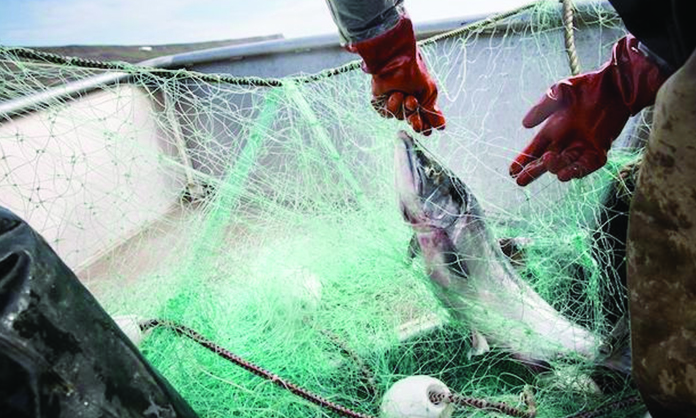Megameno Shikongo, the daughter of a former fisherman, was forced to drop out in her second year at the University of Namibia when her father lost his job in the aftermath of the Fishrot corruption scandal.
Shikongo, who was studying accounting and finance, dropped out in 2020 when her father could not afford to pay for her studies any more and now lives at the remote Omutele village in the Oshikoto region with her parents.
She told an Institute of Public Policy Research (IPPR) team that she wanted to complete her studies to help out her father who is the breadwinner at home, as well as the extended family.
“The situation at home is terrible. We survive on the government feeding scheme. My father even sold his livestock to keep the family going,” she says.
This story is one of many contained in the IPPR’s second human rights study, ‘Right Now I Cannot Survive’, which traces how the Fishrot corruption scandal affected the lives of over 600 former fisheries workers.
According to the report, 89% of former fisheries workers say they know a friend or former colleague who turned to alcohol abuse to escape the pressures of their circumstances, while 68% of former fisheries workers say they have indulged in alcohol abuse since losing their jobs due to the Fishrot scandal.
“This whole Fishrot thing is horrible to think about. These people killed us, they killed our livelihoods, they killed our families and they killed our children. We used to help many people, starting from our children to our extended family, who all depended on us to survive. But now they have destroyed so much of our lives,” a former fisherman says.
Meanwhile, about 54% of former fisheries workers say they have become separated from or lost contact with members of their extended family since losing their work, while about 36% say they have become separated from a partner or spouse and children since losing their work.
“Now, my family and brother don’t communicate with me any more. Because now, they don’t like me anymore because I got nothing. There’s no communication,” one former fisherman says.
Another says: “When you are raised in a village, you are raised to look after your parents and family members. I am talking of siblings and the extended family, as well as your own kids. Now, the fact that you don’t have anything to take home, there is no way that you can go back. You will be ashamed of yourself.”
The majority of former fisheries workers referred to themselves as being single (52%) at the time, with all of them saying they had been in long-term relationships while they were employed.
Almost 33% say they are married and 15% indicated that they are in some sort of relationship, mostly of a casual nature, based on their descriptions.
Furthermore, the report indicates that a few of the fisheries workers mention having had suicidal thoughts and a general feeling of hopelessness about the future.
“They attribute this to the stress of unemployment which has also led to family breakdowns, including divorces and strained relationships with children and relatives,” it says.
Currently, most of the former fisheries workers said their only source of steady income is the Government Employment Redress Programme (GERP) stipend of N$4 000, which they have been receiving since 2020.
“Most say the GERP money is not enough to live on, either for themselves at Walvis Bay or to maintain drought-stricken households back in their home villages,” the report reads.
SAMHERJI’S ACCOUNTABILITY
Looking ahead, former fisheries workers want the government to facilitate dialogue with Samherji and the Icelandic government to negotiate compensation that would enable them to regain the assets they lost – such as homes, cars and savings.
They demand that Samherji at least pays them financial compensation of about N$1.4 million (US$80 000) each.
The IPPR has urged the Icelandic fishing company Samherji to issue an apology for its involvement in the Fishrot corruption scandal and to provide full compensation to the affected individuals and communities.
IPPR research associate Frederico Links says most of the affected former fisheries workers are unskilled or low skilled migrant labourers from rural and mostly poor communities across the northern stretches of Namibia.
Most are now middle-aged men in their late 30s to late 40s.
“Most are now struggling to find work, whether in the fisheries sector or other sectors, with their low and/or unskilled profile contributing to their struggles to secure any sort of employment, whether at Walvis Bay or elsewhere,” Links says.
IPPR director Graham Hopwood says five years after the scandal was exposed, Namibians impacted by the Fishrot scandal are yet to receive adequate redress for the losses they have suffered.
“As a result, the IPPR calls for Samherji to make full redress to directly affected and impacted individuals and communities for the disruption and devastation inflicted on their lives as a result of Fishrot,” he says.
For this study, 90 former fisheries workers and a handful of current fisheries workers directly affected by the Fishrot scandal were surveyed and interviewed between April and September 2024.
The first report was released in March this year.
Stay informed with The Namibian – your source for credible journalism. Get in-depth reporting and opinions for
only N$85 a month. Invest in journalism, invest in democracy –
Subscribe Now!







